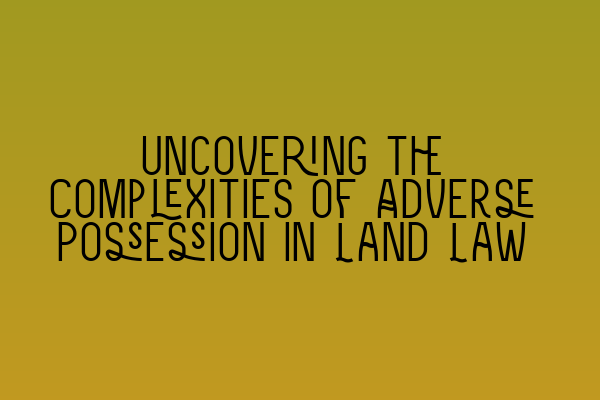Uncovering the Complexities of Adverse Possession in Land Law
Welcome to the SQE Property Law & Land Law blog, where we delve into the intricacies of property law to help you gain a deeper understanding of its complexities. In today’s post, we will be focusing on the concept of adverse possession and its relevance in land law.
Adverse possession, also known as squatter’s rights, is a legal principle that allows an individual to gain legal ownership of a piece of land by possessing it continuously for a specified period of time. This principle may seem straightforward at first glance, but in reality, it is a complex area of law that requires careful consideration and analysis.
To fully comprehend adverse possession, it is important to understand its fundamental elements. Firstly, there must be an actual possession of the land in question. This means that the individual claiming adverse possession must physically occupy and control the land, treating it as his or her own. Needless to say, simply wandering onto someone else’s property does not constitute adverse possession.
Secondly, the possession must be adverse to the rights of the true owner. In other words, the individual asserting adverse possession must possess the land without the true owner’s permission and without any legal right to do so. This element ensures that adverse possession cannot be claimed by someone who initially had lawful possession of the land.
The most contentious element of adverse possession is arguably the requirement of continuous possession for a specific period of time. This duration varies depending on the jurisdiction, but it typically ranges from 10 to 20 years. During this time, the individual must maintain exclusive occupation of the land, meaning that they have full control and possession of it, without the interference or consent of the true owner.
It is important to note that adverse possession does not automatically grant legal ownership. Instead, it provides a legal mechanism through which an individual can claim ownership by virtue of their long and uninterrupted possession. This means that the true owner can attempt to challenge the claim by asserting their rights and initiating legal proceedings.
The complexity of adverse possession lies in the various legal considerations and exceptions that may arise during the process. For example, some jurisdictions require the claimant to demonstrate that their possession was in good faith, meaning that they genuinely believed they had legal ownership of the land. Additionally, certain circumstances, such as if the land is registered with the Land Registry, may affect the validity of an adverse possession claim.
To navigate these complexities successfully, it is crucial to seek expert legal advice from a qualified solicitor who specializes in property law. At SQE Property Law & Land Law, our team of experienced solicitors is well-versed in the intricacies of adverse possession and can advise you on the best course of action based on your specific circumstances.
In conclusion, adverse possession is a multifaceted concept in land law that requires a comprehensive understanding of its elements and complexities. Whether you are considering asserting adverse possession or are a true owner facing an adverse possession claim, it is crucial to seek professional guidance to ensure that your rights are protected.
If you found this blog post informative and would like to explore more topics related to property law and land law, we encourage you to check out our related articles. For SQE exam preparation resources, we offer practice exam questions and mocks for SQE 1 and SQE 2. Additionally, we provide comprehensive preparation courses for both SQE 1 and SQE 2. Stay informed about the latest SRA SQE exam dates by regularly visiting our article on the subject.
Thank you for reading, and we hope this blog post has shed some light on the complexities of adverse possession in land law. Remember, when it comes to property law, knowledge is power, and our team of experts is here to empower you.
